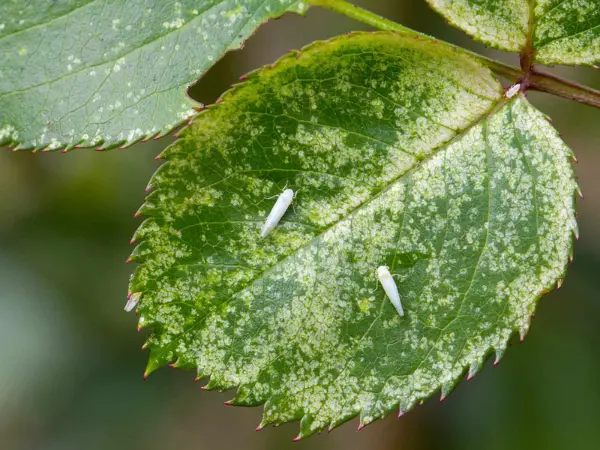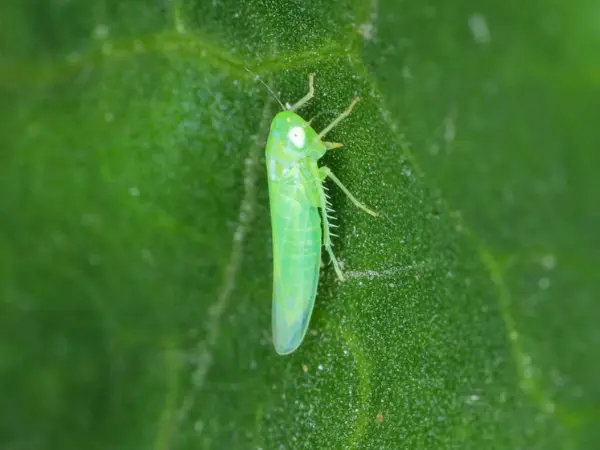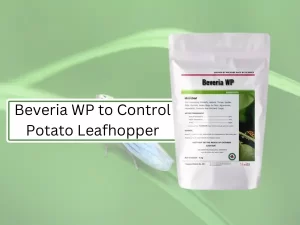Potato leafhoppers are hazardous creatures and are part of the leafhopper family Cicadellidae.
To control them, it’s effective to use insecticidal soap, neem oil sprays, and Beveria WP potato leafhopper insecticide on affected plants. Additionally, planting resistant varieties and using row covers can help prevent infestations.

If the pest is an adult, then mostly it looks limey and bright green. It is around 3 mm long, making it a hazardous one when attacking the crops, especially the potato ones. Adult ones are very active insects and also fly above the plants when disrupted as they are at the end of what we call the potato leafhopper life cycle.
The nymphs that do not have wings prefer to move from side to side as they do not have the complete movement capacity.
This pest can attack wild plants, legumes, and cultivated crops. When these insects feed on the plant, you will see a different result that weakens the plants, and it is called “hopper burn.”

Novobac’s research in sustainable agriculture makes biological practices, like organic potato leafhopper control, ideal for maintaining soil quality and plant health. While many people are not practicing it with proper awareness, it is the best possible option.
Beveria WP containing Beauveria bassiana is a very effective bio-insecticide to do biological control of potato leafhopper. Beauveria bassiana is a naturally occurring fungus and provides terrific control against a lot of pests, including whiteflies, thrips, aphids, and other garden insects. It is an ideal choice as it can act as a natural pesticide for any indoor garden or outdoor garden. Potato plants can be protected quickly and can maintain excellent health very easily.

It is like magic for people looking to have a good crop season without hampering the soil for future generations by doing biological management of adult potato leafhoppers. You need not worry thinking about how to get rid of potato leafhoppers while doing biological practices.
Beauveria bassiana controls insect vectors very quickly. This fungus is found naturally in soils all over the world. Fungi spores attach to insect cuticles, germinate, colonize inside, and release toxins, quickly killing the insect.It acts as a long-lasting control method, as you can see the effects on the whole farm.
Chemical insecticides often have side effects, whereas biological practices are safer, targeting only specific pests. It is a natural and eco-friendly option. It provides control over a lousy group of insects very quickly, making it the best option as a vegetable insecticide, especially when we are talking about potatoes. If you combine sanitation with it, then you can get an enhanced level of control very quickly.
Biological practices are usually better as compared to chemical practices. There are a few reasons:
Beveria WP is the best option as far as insecticides to fight the pests are concerned. There are also a few other potato leafhopper insecticides to do potato leafhopper organic control but not as effective as this insecticide. Once you optimize the application process you will not panic thinking how to get rid of potato leafhoppers. There are a few points that you should keep in mind so that you can easily optimize its application.
Beveria WP might be new in the market, but if you check out the details about it, then you can check the university trials in Florida tomatoes. Commercial tomato fields in California have tried to reduce bacterial wilt incidence by up to 65%. It also gives a yield increase of 25-40% in treated plots very easily. Beveria WP’s active ingredient effectively protects potatoes from leafhoppers without harming beneficial insects, offering farmers confidence in managing pest issues.
Novobac offers effective biological solutions for controlling bacterial wilt and insect vectors like whiteflies and potato pests, gaining a strong reputation for sustainable agricultural practices and specialized biological insecticides.
These pests cannot have a breathing space if you keep the Beveria WP developed by Novobac handy with you. This brand has been doing great as far as manufacturing and researching more is concerned.
Get Rid of Whiteflies on Tomatoes
How to Get Rid of Aphids on Tomatoes
Biological Control Spider Mites
As a plantation owner, I face quite a few..
The banana weevil, also known as Cosmopolites sordidus, is..
Fusarium wilt in banana is usually known to be..

Leave a Reply